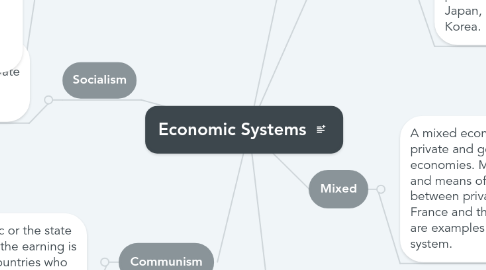
1. Socialism
1.1. Socialism means everyone shares the value instead of the value being owned by private owners. Countries who have socialism include China, Cuba and Vietnam.
1.1.1. PROS: a benefit to socialism is "working the land" or having the ability to make good use of available resources. In newer terms, everyone involved has the advantage of prospering from making better use of their resources for production as long as they put in their share of the work.
1.1.2. CONS: disadvantages of socialism is slow economic growth, less entrepreneurial opportunity and lack of motivation due to laziness or not having or wanting the will to work.
2. Communism
2.1. Communism is when the public or the state own productive resources and the earning is divided among the citizens. Countries who have communism are China, Vietnam and Cuba.
2.1.1. PROS: communism is built around communities and advocates education, which is a major plus for our future generation. A communist society divides ownership evenly among its members.
2.1.2. CONS: small business are almost nonexistent in a communist society due to property being evenly divided meaning, no matter how hard you may work for your business it may always just remain a small business.
3. Economic System in United States of America
3.1. The United State of America is made up of fifty states with everyone wanting to "make it" or"be the next best thing". Examples of economic systems are social, capitalism and communism as well as mixed economy. Every economic system brings natural resources, labor and technology to produce and distribute goods and services to society. The American economy is best described as a "mixed" economy with the government playing an important role along with private enterprise. Please refer to Outline of the U.S. Economy: How the U.S Economy Works (https://usa.usembassy.de/etexts/oecon/chap2.htm)
4. Capitalism
4.1. Capitalism is like democracy. According to Milton Friedman "democracy can only exist in a capitalist society". Capitalism is trade being controlled by private owners for profit. Countries who have capitalism are Japan, United States of America and South Korea.
4.1.1. PROS: a huge advantage for capitalism is the ability to choose which leads to competition which leads to better products and services. Capitalism is the only economic system that allows equal chance of success.
4.1.2. PROS: a mixed economy can offer a safety net that prevents absolute poverty and allows people to financial rewards of hard work and entrepreneurship. Mixed economy also helps public ownership in productivity which can help community needs.
4.1.3. CONS: disadvantages of capitalism include high unemployment rates, economic instability and slow economic growth.
5. Mixed
5.1. A mixed economic system is when both private and government share control of economies. Modern economies are mixed and means of production are shared between private and public sectors. France and the United States of America are examples of a mixed economy system.
5.1.1. CONS: because the economic system is mixed with both private and government, there is a challenge finding a balance of economies with the government sometimes mismanaging their role however, a mixed economy does give the government less control providing freedom to prosper.

